Hey, my friends.
I’m on the train right now (well, this train ride was April 9th, but I’m just finishing the post now), on the way back from a really special experience up at Kripalu Center for Yoga & Health in Stockbridge, MA. I’m getting used to writing on trains (and even train platforms sometimes), as I’ve got a big writing deadline in front of me. I haven’t said anything about this on the blog yet – I’ve only announced it on instagram, but I’m on an instagram break at the moment (which is changing my life and revolutionizing the way I think about work – LOTS more details on that in another blog post soon).
The news is: I’m writing a book! An actual real, live book. Like a book book. It feels so surreal to actually say that…
Since September, I’ve been going through the process of creating a book proposal, signing with a book agent, shopping my proposal around to the New York City publishing houses, and finally…signing a publishing contract. It’s felt like a complete whirlwind and a slow, slow burn all at once. It’s kind of hard to believe I’m sitting in this spot now, as an author with a real live book deadline.

I’ve always dreamed of writing a book. I’ve always had that romantic vision of walking into a bookstore and seeing my book on the shelf. But I never wanted to write a book JUST to write a book, or just to HAVE a book. I wanted to write a book when the timing was right, when there was a specific book that just had to be written, and had to be written by me, and had to be written now. That’s what seems to be happening at the moment, and it’s been a magical (and challenging) experience in so many ways.
I’ll share more about the specifics of the book soon, but if you want to be on a list to be the first to hear the details, you can click here and sign up to receive updates about the book. I’ll send out the cover when it’s done being designed, the title, some sneak peeks of what’s in the book, and you’ll be the first to find out when the book is available for pre-order. All that exciting book stuff. So I hope you’ll sign up here to get book updates. :)
But the bottom line is this: I’m publishing a book with Penguin Random House. It will be out in 2020, and I have to finish writing the manuscript by September 1. So for the next few months, I’ll be deep in writing and research mode. It’s awesome and I’m grateful. I’ve been writing online since the end of 2007, so this feels like a magnificent and exciting milestone in my life as a writer…I’ll never forget this journey or those who have inspired and mentored me along the way.

So my goal with this blog post is to shine some light on the process of how to work towards getting a book deal with a traditional publisher, if that’s what your dream is.
Back to why I’m writing on a train right now: I’m on the way back from teaching at Gabby Bernstein’s “Bestseller Day.” This is her most intimate event (Level 3 of her Spirit Junkie Masterclass Training), where she teaches a group of aspiring authors how to get started with writing and publishing their books. “Bestseller” in this sense simply refers to writing a great book that will reach and help as many readers as possible.
Learn more about Spirit Junkie Masterclass Business Training
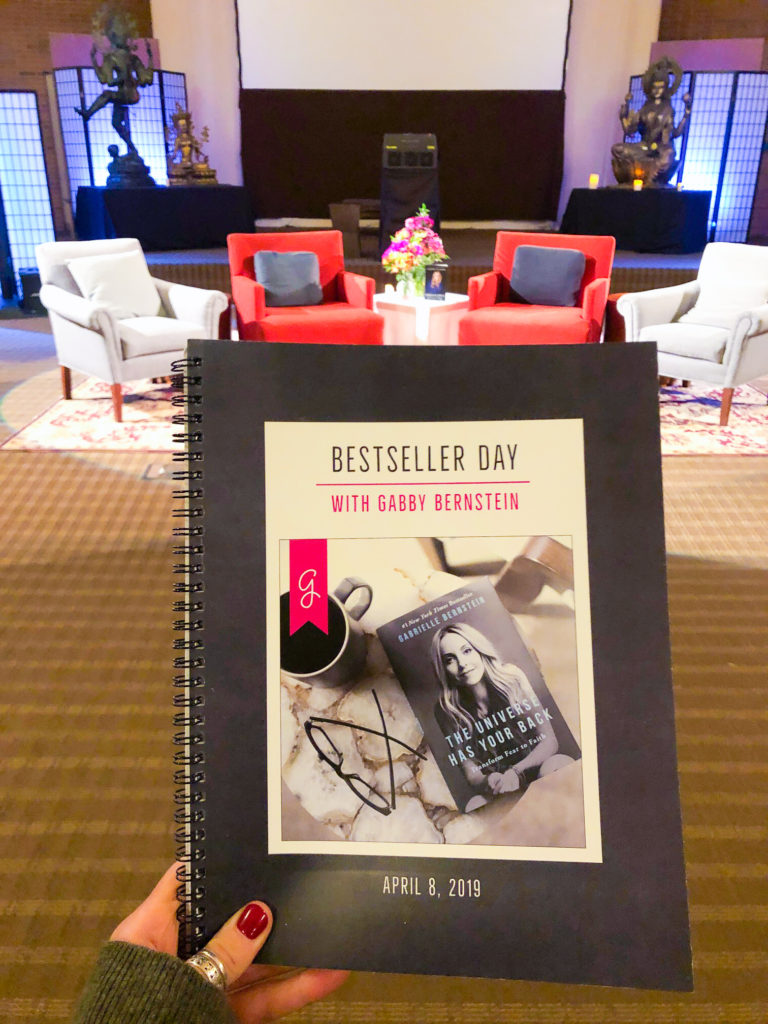
I had the great honor of teaching during the part of the day that was focused on “how to create a book proposal that sells,” and I shared my whole proposal with the group, page by page on a big screen in front of the room. It was so cool (and again, surreal) to be able to share this massive project with a group of authors who are getting started with this process — because I know how daunting it can feel.
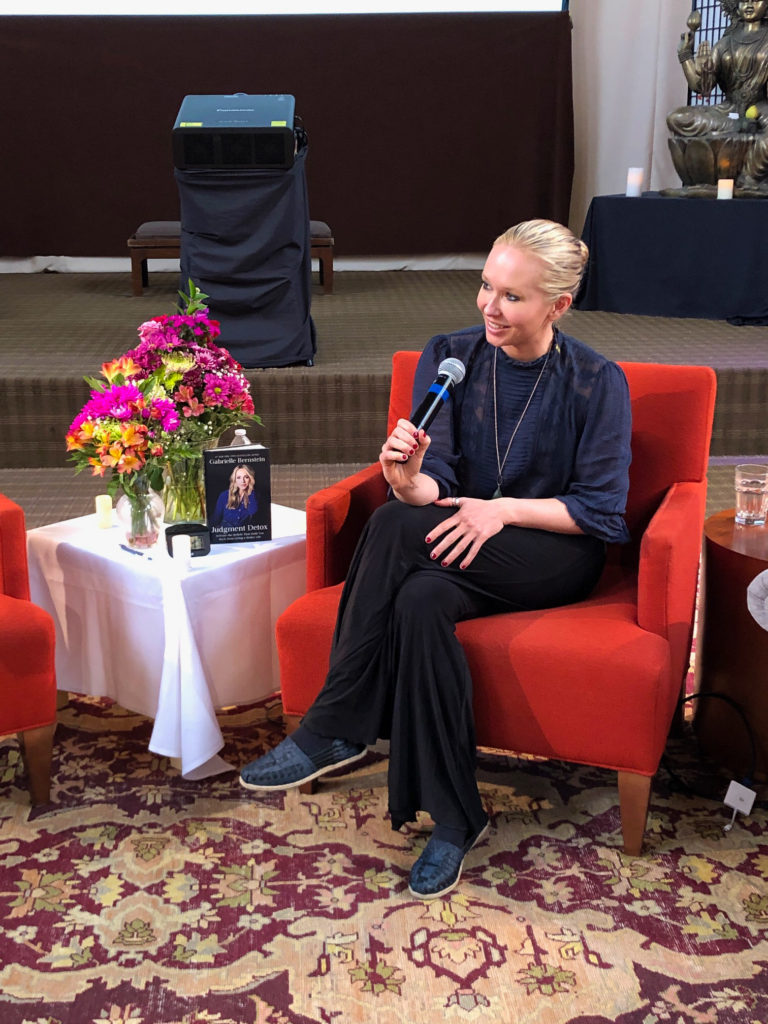
The best part of it all is that I got to teach alongside Gabby and the 2 rockstars who helped me make my proposal into the polished, professional 70-page document that it was: Richelle Fredson and Janna Hockenjos. Getting to hug them in person after only speaking with them virtually during the proposal process was so.
Janna edited my proposal and will be editing my book, and Richelle gave me book proposal insights from a publisher’s perspective and helped me create the marketing plan for my book, which went into the proposal. And of course, Gabby has been teaching me about the ins and outs of life as an author for the past 12 years. I have to say, being up on stage with these 3 women was one of the most special and meaningful moments of my life so far. We all cried at some point, I think.
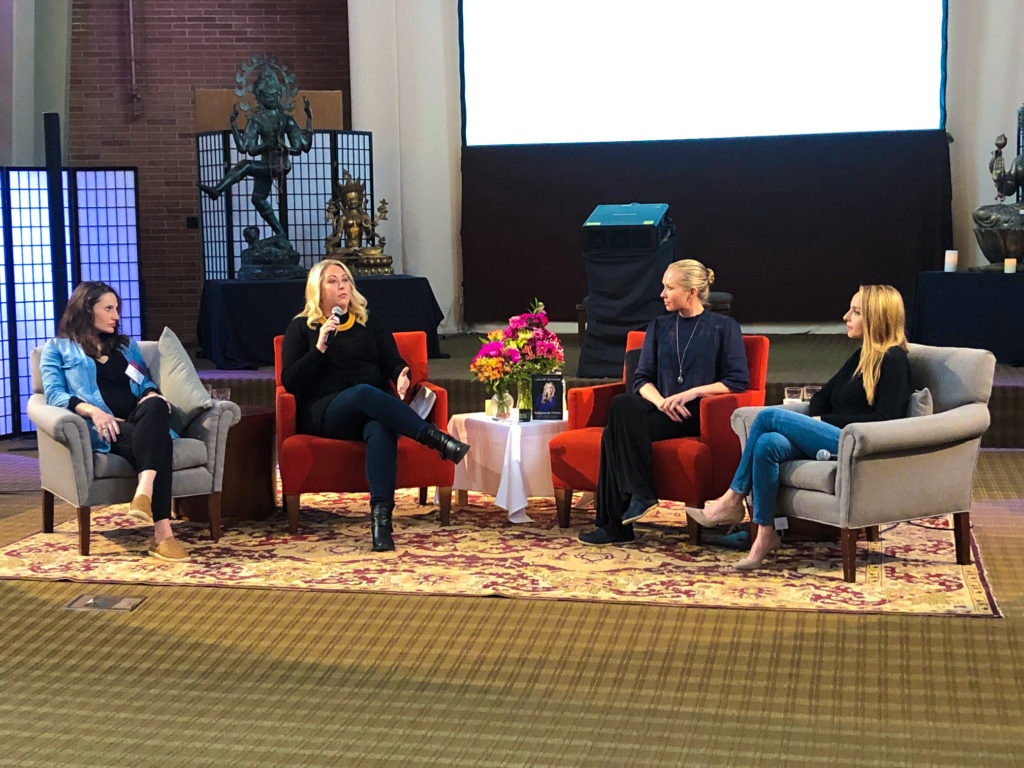
One of the things I talked about up on stage is the reality of writing a book proposal. I had NO idea how to write a book proposal a few months ago, and now I can safely say – I know a lot more.
As soon as the word about my book deal started to get out, a bunch of people emailed me asking me if I could send them my proposal so they could use it to create theirs. At first I thought I might share it with friends, but the truth is – this project was so incredibly massive and took so many months of work (and a financial investment, as I hired people to help me with it), and it felt so personal — like it was my baby. I didn’t feel right about having it just floating around on the interwebs. So at this point, the only people I’ve actually sent it to are my agent, my publisher, and Richelle and Janna (who worked directly on it with me). I may not ever send the whole proposal to anyone else…I’m not sure yet. But I do want to offer as much helpful information here as possible, so I’m going to break it down a little bit for you guys here. If you’re at the beginning of the book proposal process and not sure how to get started, I hope this gives you some clarity.
I’ll share all the resources I used for my proposal, and I’ll give you access to the exact outline I used to write mine.
How To Get Started With Writing A Non-Fiction Book Proposal For A Traditional Publisher
If you want to write a book proposal and get published by a traditional publisher, here are some guidelines based on what worked for me to get a great book deal with a major publisher as a first time author.
Not everyone wants to go the traditional publishing route, and that’s great. Self publishing is a wonderful option, and there are some great resources out there on self-publishing – in particular, check out my friend Emily Benson, who taught the self-publishing portion of Bestseller Day.
I’ve been toying with the idea of self-publishing vs. traditional publishing for years, but I feel really confident about my decision to traditionally publish this book. My agent and publisher have been wonderful allies so far in helping me get this book created so this message can get out into the world…(and so I can have that life-dream-moment where I walk into a bookstore and see my book there). :)
So whether you decide you’d like to self publish or publish traditionally, either route has its benefits.
Tim Ferriss shares some other resources on traditional publishing vs. self publishing here.
But if you know you want to write the kind of book proposal the big publishing houses are going to require in order to get a traditional book deal, here are some helpful guidelines (based on my experience):
Non-Fiction and Fiction Book Proposals Are Different
If you’re a fiction writer, the majority of the time you’ll need to write the full manuscript before pitching it to a publisher. This isn’t always the case, but a lot of times, especially for first time authors, it is.
For non-fiction, you’re essentially writing a business plan. You’ll want to show the publisher that investing in your book idea and investing in YOU as an author will be a smart business decision for them. Non-fiction writers typically pitch their book idea to a publisher before even writing the book. Once the publisher buys your book idea, you use your proposal as the outline for writing the book.
It’s A Lot Of Work
The first thing I’ll say about writing a great book proposal is that it’s a lot of work. As I mentioned, my proposal ended up being 70 pages in the end. I believe the average is 60-80 pages for a non-fiction book proposal. I basically did nothing but write my book proposal for 3 months straight, and I had to set boundaries like I never have before — I kept my phone turned off a lot, I made very minimal plans with people, I had to put aside some of the other things I wanted to work on. I snuggled in under a blanket with lots of espressos and worked harder than I ever have before.
Of course, there are those exceptions where people don’t have to write book proposals (say, if you’re a celebrity, you already have your book completely written, or you otherwise have someone seeking you out specifically to write a book), but for the most part, getting a book deal isn’t just something that magically “happens.” It takes time, effort and professionalism. I don’t say that to scare you away or intimidate you – I say that to tell you that if your goal is to be an author and write a book, you have to be willing to put in the work — even before you write your actual book. The good news is, you CAN definitely do it. :)
Your Book Proposal Is Your Business Plan
Your non-fiction book proposal is your business plan. You want the publisher to know who you are, what your story is, what your book idea is, why YOU are the perfect person to write it, and why the subject is timely and needed by your readers. You want to show them exactly how you plan to spread the word about your book and sell copies, that you understand marketing, and of course, that you can write (although some people do hire writers to write their books for them). You’ll be presenting the publishers with a marketing plan, the table of contents for your book with summaries for each chapter, sample chapters, and more (I share my exact non-fiction book proposal outline below).
It Takes A Village
I truly understand now why authors have so many people to thank in their acknowledgments section. As I mentioned, I not only took 3 months to write the proposal, but I hired a few different people to help me with it. I had no idea I actually needed an editor to help me edit my proposal before sending it to my agent, but Gabby encouraged me to hire one (even though I was protesting, convinced I could edit the whole thing myself) – and it made a huge difference. Janna was able to go through my proposal and clean it up, make suggestions, and help me re-word things that I wouldn’t have been able to think of by myself. It really helps to get a fresh set of eyes on your proposal, because you’re so close to the work and you may not see mistakes or parts that are unclear.
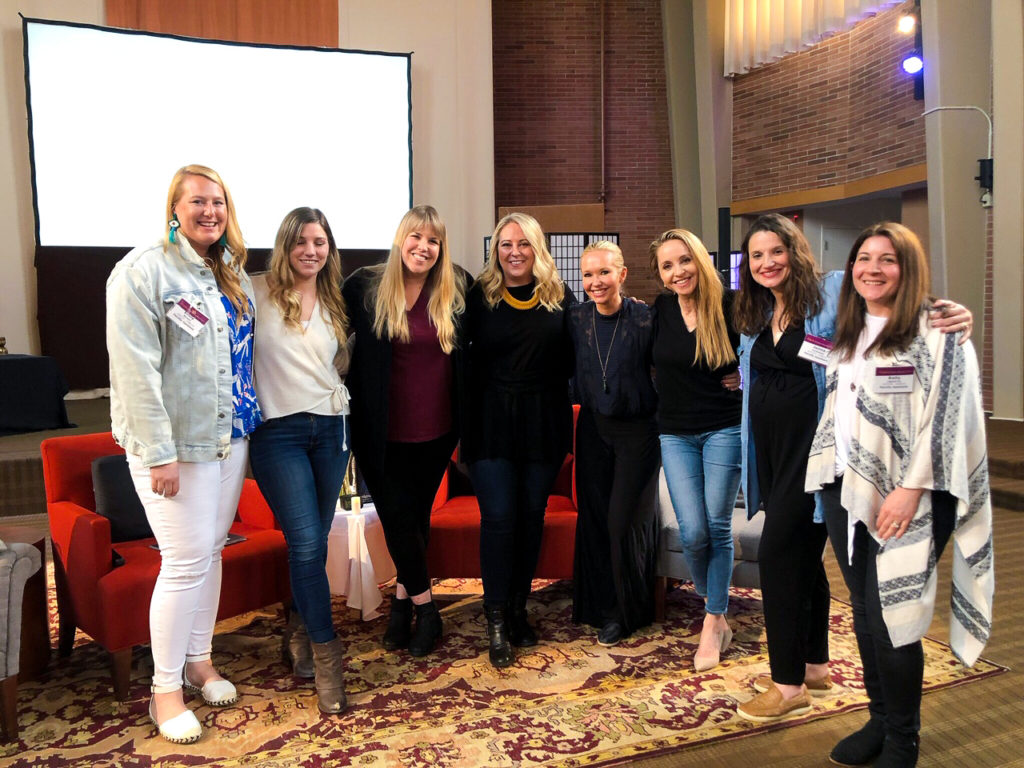
Richelle was the final person to look over my proposal before it went out to publishers – she has 15 years of experience working in publicity for books at a publishing house, and she knew exactly what the publishers would be looking for. She helped me craft my marketing and publicity section with stellar marketing ideas, and gave me suggestions on how to write my proposal in a way that a book acquisitions editor and the publishing house would be able to connect with. I can’t imagine sending my proposal out to my agent without this help. I could have done that, of course, but they added so much more magic to it.
My book agent, Stephanie, was also a HUGE help to me during the proposal writing process, and she gave me a ton of direction. When I was in meetings with book publishers in NYC (we went to 8 meetings), all of them seemed really impressed by the level of professionalism I brought to my proposal, and I KNEW they would be, because of the stellar team I had on my side. Walking into those meetings, I felt excited and confident – because I did everything I could possibly do to make my proposal great. My agent and I were giddy throughout the process, because we could FEEL the magic that had been infused into the proposal.
Here’s a good post on how to get a book agent by Ryan Holiday.
Of course, you don’t have to hire anyone to help you and can definitely do the work yourself. In my case, I thought it was really worth it to have a few people help me, and I ultimately believe I had much more interest from publishers than if I hadn’t had the extra editing, eyeballs, and advice.
The Sections To Include In A Non-Fiction Book Proposal
I’m sharing the exact outline with you that I used for my book proposal. If you’d like access to it, you can download it as a free PDF here, in exchange for your email address. When you opt-in to that form, I’ll also have you on my email list to send you updates about the book.
So enter your email address here and I’ll send you my exact book proposal outline.
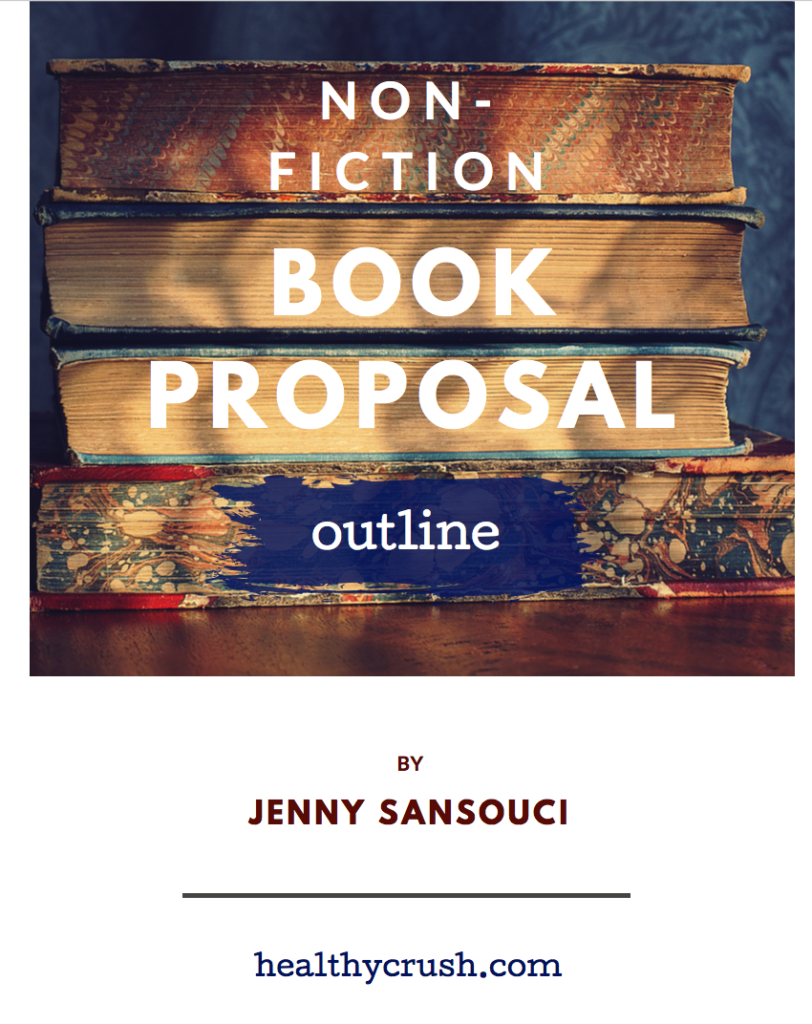
How The Book Proposal Process Works
Even if you don’t have a book agent yet, you’ll still want to write a book proposal. Although you can write query letters to book agents with your book idea without a proposal to see if they’re interested (most agents have a contact/submission form on their website), having a great book proposal already written will definitely help to get the book agent to take you seriously and want to represent you. Your agent will ask you to write a book proposal anyway, so you may as well get started. In fact, even though I had been in many conversations with my book agent before my proposal was finished, she didn’t “officially” sign me as her author until my proposal was complete.
Writing a proposal is a win for you no matter what, because the proposal will become your book outline and help you greatly in actually writing the book.
If you have a book agent and a book proposal, your agent will reach out to the editors at different publishing houses that may want to publish your book. If the editors / acquisitions team is interested in your book, they’ll set up a meeting with you and your agent. This can be done in person if you’re available for it, or over the phone if you can’t come to New York for meetings (or if the publisher is located somewhere else – not all publishing houses are in New York). Then, if publishers are interested in your book, they will make an offer. The way this happens can vary based on how your agent wants to approach the process, the number of publishers interested, if anyone wants to put a “pre-emptive” bid on your book so nobody else can have it…etc. If you’re at this point in the book process, your agent will explain every detail to you about how it works.
Here’s another post by Tim Ferriss about how he got signed as a first-time author. He says here that his first book proposal was only 20 pages, so, you don’t necessarily have to make yours as long as mine was. It’s worth noting that 40+ pages of my book proposal were the sample chapters. I included 3 full sample chapters in my proposal. So only about 30 pages were dedicated to the “actual” proposal part of the proposal.
Alright. So there you have it! I hope this helps to demystify a little bit of the book proposal process for you. Good luck on your book-writing journey – it’s so special, books are so special, and I’m excited to share more with you guys about the writing process along the way. One of the reasons I’ve been on a hiatus from social media is so I can get into the deep work of actually writing a book without distractions. I’ll be sharing more about that soon (get on my email list to read my”I Deleted Instagram For 30 Days” blog post as soon as it’s live, it will include an epic list of resources) – but in the meantime, I highly recommend the book Deep Work by Cal Newport.
Ok, thanks guys. I love you.
Here’s the link again to get my book proposal outline.
Here’s the link again to sign up for updates and sneak peeks from my upcoming book.
Here’s a video from Gabby about how to feel more confident and connected to your purpose.
If you have questions, please leave them in the comments section below!
Learn more about Spirit Junkie Masterclass
xx
Jenny



JULIE says
I cannot wait to hear what your book is going to be about!
Stacey says
Congrats on the book, I can’t wait! When will your Instagram post be live?? Cannot wait to read it:)